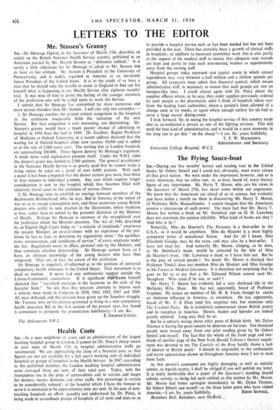Health Costs
SIR,—As a near neighbour of yours and as administrator of the largest teaching hospital group in London, I cannot let Dr. Piney's cheap sneers in your issue of March 17th at hospital administrative staffs go unanswered. We are approaching the close of .a financial year, so that figures are not yet available for a full year's working cost of individual hospitals or groups of hospitals in the Health Service. In 1947, according to the published statistics, the London teaching hospital administrative costs averaged three per cent, of their total cost. Today, with the tremendous rise in the price of commodities and in salaries and wages for doctors, nurses, domestic and other staffs, this percentage is certain to be considerably reduced ; at the hospital which I have the honour to serve it is estimated to be approximately nine per cent. In the case of non- teaching hospitals an effort, possibly not understood by Dr. Piney, is being made to co-ordinate groups of hospitals of all sorts and sizes so as to provide a hospital service such as has been needed but has not been provided in the past. There has certainly been a growth of clerical staffs in hospitals ; in addition to increased committee work this is also partly at the request of the medical staff to ensure that adequate case records are kept and partly to take such non-nursing matters as appointments away from the nursing staff.
Hospital groups today represent vast capital assets in which annual expenditure may vary between a half million and a million pounds per group. All taxpayers must admit that financial control, which means administrative staff, is necessary to ensure that such groups are run on business-like lines. I could almost agree with Dr. Piney about the supplies officers where, as he says, they order supplies previously ordered by such people as the pharmacist, until I think of hospitals taken over from the leading local authorities, where a patient's linen allowed of a change once in six weeks, or again where enough cutlery for six had to serve a large nurses' dining-room.
I look forward, Sir, to seeing the hospital service of this country made into as co-ordinated a service as one of the fighting services. This will need the best kind of administration, and it would be a poor economy in the long run to get this " on the cheap."—I am, Sir, yours faithfully,
T. F. W. MACKEOWN, Administrator and Secretary. University College Hospital, W.C.1.






































 Previous page
Previous page